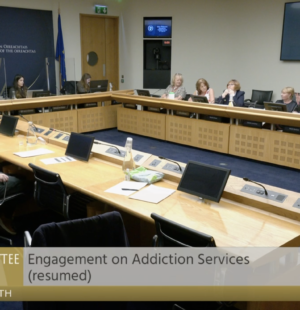A different kind of White Christmas
Are you dreaming of a white Christmas this year? Be careful of what type of ‘White Christmas’ you are wishing for, with ‘White Christmas’ translating as something completely different to certain people using the white powdered drug, cocaine.
It’s no secret by now that Cocaine has seen an enormous resurge in recent years. It’s being used across all different demographics and occupations and not just in cities, but in rural villages across Ireland too.
Here at Tabor Group, our statistics from clients that have received treatment certainly backs up this statement. In our secondary residential treatment centre, Tabor Fellowship, Cocaine came out on top as the specific drug of choice in 2019. A massive 94% of clients stated Cocaine as a drug of choice, surprisingly 4% more than alcohol. This was a substantial increase of 12% in comparison to 2018. Equally, in our primary residential treatment centre, Tabor Lodge, cocaine saw an increase of 6% as drug of choice among clients in 2019 in comparison to the year previously. This was the second most popular drug of choice, behind only to alcohol.
With a spike of cocaine use being common during the festive season, in this blog we are going to give you some of the short-term and long-term effects of cocaine use to highlight the dangers of a ‘White Christmas’. Despite the COVID-19 pandemic, this surge in cocaine has not slowed down, with almost every second call we receive from individuals suffering from addiction or their loved ones being related to cocaine.
How is Cocaine used?
Cocaine is a strong but short acting stimulant drug which is usually used by dividing into lines and snorted up the nose. It is also possible to smoke cocaine or making into a solution to inject, but it would be a less common way to use the drug.
Short-term effects of Cocaine
Depending on how the individual takes it, cocaine’s effects start quickly but the high only lasts for about five to thirty minutes, giving the user a sense of confidence, well-being, alertness, and heightened sexuality. The negative effects of the drug last a lot longer however; here are some of the most common side effects:
- Your heart and pulse rate speed up suddenly
- Hyperactivity, dilated pupils, dry mouth, sweating and loss of appetite
- Higher doses can make you feel very anxious and panicky
- Increased sex drive
Long-term effects of Cocaine
Because cocaine severely decreases appetite, many addicts are severely malnourished, leading to even more health problems than the drug already causes. Here are some of the other long-term effects:
- Tightness in chest, insomnia, exhaustion and unable to relax
- Dry mouth, sweating, mood swings and loss of appetite
- You may become aggressive or even violent
- You may feel depressed and run down
- Damage to nose tissue
- Digestive disorders, dehydration and anorexia
- Kidney damage
- If you use it often you may lose your sex drive
- Injecting may cause abscesses
- Smoking may cause breathing problems
- Anxiety, paranoia and hallucinations, if you use a lot
- Weight loss
Other Dangers of Cocaine use
- Overdose can cause epileptic fit, stroke, breathing problems and heart attack
- Damage to veins if you inject and a risk of HIV and hepatitis if you share needles
- When you mix cocaine with alcohol, they combine to produce cocaethylene, which increases the risks of damage to the heart or heart attack
- Extremely dangerous if you inject it with heroin, known as a ‘speedball’
- Increased sex drive can lead to unsafe sex, with the risk of unwanted pregnancy, sexually transmitted infections (STIs) or HIV
- Debt – cocaine is an expensive habit and you may find yourself borrowing money to buy it
- Extremely dangerous for pregnant women – cocaine causes high blood pressure and therefore increases the risk of a miscarriage, premature birth or placental abruption. It also can reduce the oxygen your baby gets through the placenta. Your baby may be smaller at birth, have birth abnormalities and a higher risk of cot death.
Cocaine will show up in your system for anything between 2-4 days afterwards usually, depending on the amount taken, but its extreme psychological addictive properties mean individuals can find it extremely difficult to live without once they start. Over time, your tolerances build up, which means higher quantities are needed to reach the same high. If an individual then stops using the drug, intense cravings occur as well as withdrawal symptoms. These include tiredness, exhaustion but unable to sleep, feeling of panic, and sometimes extreme emotional and physical distress. This can often lead to vomiting & diarrhoea, the shakes, insomnia and substantial sweating. It can also lead to long-term effects such as anorexia and depression.
Cocaine Addiction Treatment
Those who smoke cocaine are the ones most likely to have the hardest time breaking their addiction. This is because they receive the largest doses of cocaine and the effect is immediate. However, all forms of cocaine addiction need to be taken seriously because cocaine fundamentally changes the brain’s system of reward, causing people to need the drug to feel fulfilled and happy. Ultimately, this leads to a psychological addiction.
Because withdrawal can cause suicidal thoughts in some users, doctors often recommend inpatient treatment programs so that they can be monitored twenty-four hours a day and given plenty of therapy to help work through the depression and anxiety.
Because cocaine is not a poor man’s drug, many addicts undergo counselling not only for mental addiction, but also for financial and relational problems due to the fact that many users let the drug destroy every aspect of their lives. A substantial number incur massive debt and destroy relationships due to their addiction. After treatment we recommend the recovering addict join a support group because cocaine can cause random, intense cravings even years after last use.
Get Help at Tabor Group
If you or a loved one are suffering from an addiction to cocaine, get help today. We can help you recover in a healthy, friendly environment and beat your addiction. Don’t hesitate to contact one of our counsellors today at +353 (21) 488 7710 or email us at Info@taborgroup.ie and we can help you.
Recent Posts
- How to Help a Loved One Struggling with Addiction
- Tabor Group Calls for Urgent Funding to Address Growing Addiction Crisis
- Forgiveness in Recovery
- National Drugs Strategy launches interactive map to facilitate access to 442 publicly-funded drug treatment
- Statement from Colette Kelleher, CEO Tabor Group
Categories
Archives
- September 2024
- July 2024
- June 2024
- January 2024
- December 2023
- August 2023
- July 2023
- May 2023
- April 2023
- March 2023
- January 2023
- October 2022
- September 2022
- August 2022
- July 2022
- June 2022
- May 2022
- April 2022
- March 2022
- February 2022
- January 2022
- December 2021
- November 2021
- October 2021
- September 2021
- August 2021
- July 2021
- June 2021
- May 2021
- April 2021
- March 2021
- February 2021
- January 2021
- December 2020
- November 2020
- October 2020
- September 2020
- August 2020
- July 2020
- June 2020
- May 2020
- April 2020
- March 2020
- February 2020
- January 2020
- December 2019
- November 2019
- October 2019
- September 2019
- August 2019
- July 2019
- June 2019
- May 2019
- April 2019
- March 2019
- February 2019
- January 2019
- December 2018
- November 2018
- October 2018
- September 2018
- August 2018
- July 2018
- June 2018
- May 2018
- April 2018
- March 2018
- February 2018
- January 2018
- December 2017
- November 2017
- October 2017
- September 2017
- August 2017
- July 2017
- June 2017
- May 2017
- April 2017
- March 2017
- February 2017
- January 2017
- December 2016
- November 2016
- October 2016
- September 2016
- August 2016
- July 2016
- April 2016
- March 2016
- December 2015
- March 2015












